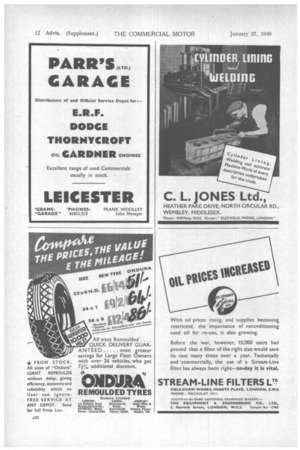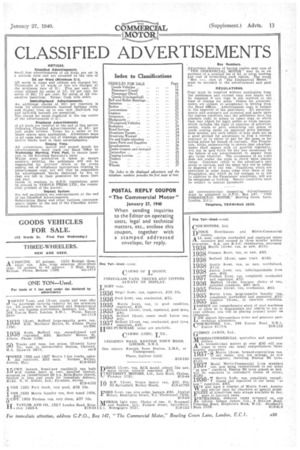What the Associations are Doing
Page 34

Page 35

If you've noticed an error in this article please click here to report it so we can fix it.
THE FINANCIAL ASPECT OF A MERGER.
A telling appeal for unity in the industry was made by Major the Hon. Eric Long, of A.R.O., at the annual dinner at Stratton, on Thursday of last week, of the North Cornwall Sub-area of A.R.O. He said he knew that unless they came under one banner they would never get the support of the House of Commons. He said to all operators that that was the one moment in their lives when it was essential that they should help to shoulder the grave problem as one man. No true agreement, he stated, had been reached between the railways and canals or between the railways and road transport.
He said that there had been talk in the Press 'about a merger, but he thought no operator present would agree to any merger unless he was satisfied as to the soundness of the finances of the other body. NATIONALIZATION TOO BIG A TASK.
The view. that the magnitude of the task involved would prevent the Government's ever taking control of transport in this country, was expressed by Mr. C. Courtney Cramp, speaking at the January meeting of the Grimsby branch of the Hull Traffic Association.
One reason against State ownership was that of financial magnitude. Another objection was bureaucratic control, and in pressing home this point Mr. Cramp quoted criticism of the Government's control through the Milk Marketing Board, which showed that 200,000 acres had gone out of cultivation since the war and 10,000 men had left the industry.
A "Square Deal" that Wants Everything.
" You will all be aware that in the so-called ` square deal ' that wants everything, the railway companies have put forward the suggestion that the C.-licence holders should not travel more than 25 miles away from their own door, and I move that an emphatic protest be made against this proposal," declared Mr. C. R. M.. Cannon, of Cambridge, at the halfyearly conference of the British Federation of Wholesale Confectioner* Associations, held in London on Friday and Saturday last. Some traders might be inclined to treat the proposal lightly, and as something that was not likely to materialize, he said, but he was given to understand that the railway companies were going to press the claim seriously. It was resolved that the Federation secretary should immediately get in touch with the British Road Federation on the matter.
Road Suffers Blame for Railway Troubles.
The only light relief, in a series of earnest but interesting speeches made on the occasion of the dinner of the East-Midland Division of C.M.U.A. On Saturday last, with Mr. J. E. Berney in the chair, was when Mr. B.. J. Bag, shaw, in proposing the toast of "The Guests " and coupling with that the name of Mr. J. H. Stirk (East-Midland Licensing Authority), told some stories of early experiences in the Traffic Court under Mr. Stirk's juriScliction. A particular one related. to an occasion when a coach operator was described as having packed 52 people into a 20-seater coach. The story runs that Mr. Stirk turned to Mr. Bagshaw and said:—" What do you think of that?" And Mr. Bagshaw's reply was:—" I don't believe it's possible, sir: I've never been able to get 50 into any of mine and I pack them tight enough!"
Councillor C. E. Worthington, president of the Leicester and County Chamber of Commerce, said that the industry needs non-destructive transport. His experience, so far as fragile goods were concerned, favoured the employment of road transport. He did not ask for cheapness: industry can stand a fair charge for transport, but
wants that transport to be reliable'. The blame for railway troubles was wrongly laid at the door of road transport. The real trouble of late was that the volume of trade had been low.
Mr, L. W. Gnpwell stressed the importance of linking up with the local Chambers or Trade. He believed that the railways were paving the way to nationalization.
Mr. J. H. Stirk, in replying toMr. Bagshaw, dealt at considerable length with the organization of road transport in case of emergency. The principal points enumerated were summarized in the leader on the first page of The Commercial Motor dated January '20.
B.R.F. Now 60 Strong..
Membership of the B.R.F. has been brought up to 60 by the addition of the Motor Factors' Association.
Road Model Moves Again.
The B.R.F. has accepted an invitation to show its road model at the Royal Institution on February 3. On this occasion Sir Charles Bressey will lecture at a conversazione, on "Bigger London or Better London?"
Another Irish Association-.
At a largely attended meeting in Dungannon, last week, it was decided to found a. new organization, the South Tyrone Traders' and Farmers' Protection Association. The new body is to communicate with all towns in Northern Ireland, with regard to taking joint action as to the proposed legislation following on the McLintock Report.
The committee of the new Association was elected as follows:—
Hews. W. Anderson, 8. Benson, J. Boyd, R. Carson. A. Dickie, W. It. Irwin, D. G. Kennedy, .I.P:, R. Leith., W. Shaw, G. Smyth, Dangannou; D. Fallen, H. McIlgorm, H. Price, Coalisland; H. P. Wilson, Dona.ghinoro. Mr. S. A.bernethy. Dungannon, was appointed honorary Kcnetary.
Optimism from Liverpool Association.
Progress of the Liverirool Cart and Motor Owners Association during the the past year was reviewed at the annual general meeting at Liverpool last week. Mr. W. J. Harper, whopresided, declared that the railway companies had receded considerably from the position they took up when the Transport Advisory Council was com piling its report. Whilst operators must console themselves in patience, pending the outcome of . the T.A.C. deliberations, a great deal of interest had beers taken in the meetings held between, the railway companies and the National Liaison Committee.
Mr. Harper said he did not subscribe to the fears expressed in certain quarters that, because this series of meetings recreated the structure of the Salter Committee, it necessarily followed that the road-transport industry would emerge bound to a policy detrimental to road haulage. If the National Liaison Committee could go a substantial way along the road towards co-ordination, then, whether it failed or not, it would have manifested the desire of the industry for something to be done in supplementation of the T.A.C. report on service and rates.
THE SAFETY VALUE OF CO-ORDINATION.
To obtain transport at a very low figure was of little interest or advantage to a trader if he knew that his competitor was paying an even lower price, as a result of. cut-throat competition, said Mr. Francis Grundy (president of the Manchester Chamber of Commerce), speaking at the recent annual dinner of the Manchester and District Traffic Association.
He objected to such a position, because excessively low rates led to conditions in which drivers' hours of work and the safety of the public and employees could be seriously affected', and the general stability of rates offered a greater promise of smooth continuance of business_ Belfast and Sand Federation Taking Approval ofof the draft constitution of the proposed National Ballast and Sand Federation was given by a special general meeting, last week, of the B.S.A.T.A. It was stated that the purpose of the Federation was to extend the work of the B.S.A.T.A., and to give it a nation-wide status. The B.S.A.T.A. would, in the meantime, continue its work.
Liverpool Meat Traders Fear "Railway Derestriction."
Mr. H. Rigby, Jun., of Rigby and Co. (Liverpool), Ltd., of Stanley abattoir, Liverpool, urged at the annual meeting of the Liverpool Wholesale Fresh Meat Trade Association that something ought to be done to safeguard the interests 01 wholesalers in regard to the railway claims. As a big quantity of produce was received through the coast ports, there was a risk that the railway companies, if they got the powers they sought, might impose prohibitive charges.
A United Fri'ait. and a Merger Sought.
The importance of a united front in the road-transport industry, in view of the railways' appeal for a "square deal," was emphasized at a meeting of the Devon and Cornwall Area Committee of A.R.O., at Plymouth, last week. The committee had previouslyresolved that "This Devon and Cornwall Area C6Mmittee unanimously considers the time now opportune fc..n overtures to be made for immediate amalgamation with the C3.1.13.A."
Monopoly Fear in Eire.
At a special meeting of farmers, merchants '5-,nd licensed hauliers in Carlow, lvt week, a resolution was adopted declaring that the granting of a monopoly to the railways, in respect of all transport, would be disastrous to farming and all business. Among those who spoke at the meeting was Mr. J. Kelly (Eire Beet Hauliers' Association). Mr. Kelly said his organization favoured the fixing of road-transport freight rates by agreement, and outlined the particulars of wages which the Association intended to put before the Transport Committee of inquiry.




















































































